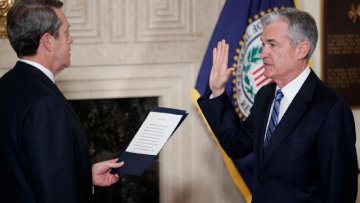WASHINGTON, April 16 (Xinhua) -- U.S. economic growth is expected to slow down in the next two years, yet not to encounter a recession.
In its new World Economic Outlook (WEO) released on April 9, the International Monetary Fund (IMF) said due to "the unwinding of fiscal stimulus," U.S. economic growth is forecast to slow to 2.3 percent this year -- down 0.2 percentage point compared with the IMF's January estimation -- and further decelerate to 1.9 percent in 2020.
"The downward revision to 2019 growth reflects the impact of the government shutdown and somewhat lower fiscal spending than previously anticipated, while the modest upward revision for 2020 reflects a more accommodative stance of monetary policy," read the WEO.
Despite the deceleration, the IMF said the pace of expansion for 2019 is above the U.S. economy's estimated potential growth rate, adding that "strong domestic demand growth will support higher imports and contribute to some widening of the current account deficit."
One factor contributing to the slowdown has to do with the U.S. Federal Reserve's four consecutive interest rate hikes in 2018, which led to continuous tightening of financial conditions.
The Fed opted for a more patient policy stance by keeping the rate unchanged during the two policy meetings so far this year.
Fed Chairman Jerome Powell said at a press conference on March 20 that officials at the central bank "now see 2019 growth at roughly 2 percent, with the unemployment rate remaining below 4 percent," and core inflation rate, which omits the volatile food and energy prices, remains close to 2 percent.
Acknowledging that the Fed and central banks in some other advanced economies "have all shifted to a more accommodative stance", IMF chief economist Gita Gopinath wrote in a blog post last week that going forward, monetary policy "should remain data dependent, be well communicated, and ensure that inflation expectations remain anchored."
Another potential risk challenging the sustainability of the U.S. economy is the country's ballooning federal budget deficit.
According to the Treasury Department's Monthly Treasury Statement report released on April 10, the deficit in the current fiscal year so far stood at 691 billion dollars, up from nearly 600 billion dollars in 2018. The department expects the red ink to exceed 1 trillion dollars when the fiscal year ends on Sept. 30.
Furthermore, weak retail sales and declining business confidence are also among the drags on economic expansion.
The Commerce Department's data released on April 1 showed that retail sales in the country declined 0.2 percent in February compared with a month earlier to 506 billion U.S. dollars.
That decrease followed a revised 0.7 percent rise in January, which didn't offset the 1.6 percent drop in December.
Powell said the Fed is "not dismissing" the downward trend in retail sales. "Our eyes are open on this," he said, adding the central bank is "patiently watching and waiting."
For the first quarter of 2019, the CEO Economic Outlook Index, a gauge of business confidence of big U.S. corporations issued quarterly by the Washington-based Business Roundtable, decreased to 95.2, down 9.2 points from the previous quarter.
In addition, CEO plans for hiring decreased 11.3 points to 80.4, plans for capital investment decreased 6.9 points to 91, and expectations for sales decreased 9.6 points to 114.
Tim Duy, professor at the University of Oregon and a Fed expert, contended in his Fed Watch blog last week that "nothing there yet to suggest that a deeper slowdown of activity is underway."
The Labor Department's job report released on April 5 showed unemployment rate kept steady at 3.8 percent in March, job addition totaled 196,000, and hourly earnings increased to 27.7 dollars.
"On the surface, this is another 'Goldilocks' report," Duy said. He added that "a hint of weakness, however, is visible," citing a slowdown in temporary help services payrolls.
Duy said the temporary help hiring "is consistent with other periods of decelerating growth," yet he still described the current economic status as "slowdown not recession."




















Latest comments